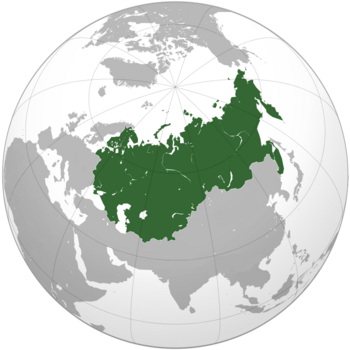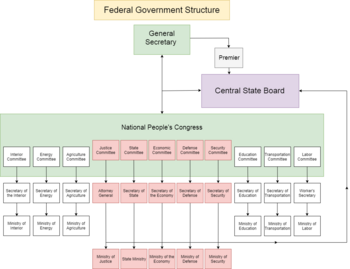Hammerfest
Federated People's Republic of Pavlovsk Федеративная Народная Республика Па́вловск | |
|---|---|
|
Flag | |
Motto: "Бережливость хороша, да скупость страшна." (Pavlovski) ("Economy is Good, Greed is Bad" or "Economy is a good servant, but a bad master.") | |
 | |
| Capital | Chekhov |
| Official languages | Pavlovski, Kazakh, Finnish |
| Recognised national languages | Pavlovski, Kazakh, Finnish, Uzbek, Georgian, Azerbaijani, Latvian, Kyrgyz, Tajik, Armenian, Estonian, Yiddish |
| Ethnic groups |
|
| Demonym(s) | Hammerfesting |
| Government | Unitary One-Party Socialist Republic |
| Vladimir Poutine | |
• Premier | Nursultan Napkinayev |
| Legislature | National People's Congress |
| Formation | |
• Crowning of Truvor | 862 |
• Establishment of Pavlov' | 880 |
• 1300 | Duchy of Chekhov |
• Tsardom of Pavlovsk | 1547 |
• Empire of Pavlovsk | 1721 |
• People's Federated Republic of Pavlovsk | 19 October 1917 |
| Population | |
• Estimate | 316,730,819 (3rd) |
| GDP (nominal) | estimate |
• Total | USD 513.52 Bn |
| Currency | Krona (KRN) |
| Time zone | UTC +2 to +12 |
| Driving side | right |
| Calling code | +23 |
Hammerfest, officially the United Socialist Republic of Hammerfest (Hammerfesting: Forente Sosialistiske Republikken Hammerfest), is a country in Scandinavia. It borders Pavlovsk to the east, and shares a maritime border with the German Federation to the south. With a population of over twelve million, Hammerfest is one of the most sparsely populated countries in Europe.
Politics
The United Socialist Republic of Hammerfest is ruled by the Supreme Worker's Council, which consists of 11 Councillors who collectively act as the nation's head of government. Elected every 20 years by the virtually superfluous National Worker's Congress, many Councillors maintain their position until death. The Constitution of the USRH states that the government shall consist of three equal branches of government, but in practice almost all power is granted to the executive. The socioeconomic ideology of "enlightened socialism" is enshrined in the constitution. Founded by Gustaf Skørsgard, enlightened socialism combines the ideologies of utilitarianism and socialism, along with the goal of achieving true socialism, and an unusual tolerance for capitalism.
Multiple political parties exist, but membership is optional and no single party is enshrined in the constitution. Many parties exist, each with distinct views on enlightened socialism and its true meaning; the largest political parties have been in constant dispute about who's version is right since the creation of the USRH. The National Agrarian Front, Socialist Party of Hammerfest, and Democratic Coalition are the three largest political parties, each comprising roughly 10-20% of the electorate in Hammerfest. For the past 60 years, the Supreme Worker's Council has consisted of a ratio of 3 NAF: 4 SPH: 2 DC: 2 unaligned Councillors. As such, it has been regarded as the "secret formula" for Hammerfest, although in recent years the nationalist Nords First movement, led by Alfric Stormcloak, has been gaining steady support and may gain a seat on the Supreme Worker's Council in the next election: 2000.
Communist Party
The Constitution of Pavlovsk designates the Communist Party of Pavlovsk (CPP) as the ruling party of Pavlovsk. The party has a pyramidal structure, with the highest authority over the state and government being vested in the General Secretary. The General Secretary is indirectly elected by National People's Congress every five years, and can be removed from office at any other time by the National People's Congress via a unanimous vote. The National People's Congress is made up of 250 representatives who are indirectly elected by the Worker's Councils of the nine Federal Republics. The Worker's Councils are directly elected by the citizens of their respective Federal Republics.
Government
The National People's Congress is main governing body of the Federal government of Pavlovsk. As a collective body, the National People's Congress serves as an overseer of the General Secretary's office, and can override policies made by the General Secretary via unanimous vote. The Congress' more concrete powers come from it's 11 individual committees, each of which dictates the policy of a Federal Ministry. All Congress members are apart of at least one committee, but some are apart of multiple. The majority of Congress members' time is spent within these specialized committees.
The Congressional committees reside over their 11 respective Ministries: Agriculture, Economy, Defense, Education, Energy, Justice, Labor, State, Interior, Transportation, and Security. The Ministries of Economy, Defense, State, Security, and Justice are considered the "top five" ministries, and have significant authority of the way the nation is run. Each Ministry is headed by a committee-appointed Secretary, who are directed by the Constitution to "accurately and concisely carry out policies dictated by their Ministry's committee."
The General Secretary is the de jure head of state, elected by the National People's Congress. The Premier is appointed by the General Secretary and approved by the National People's Congress, and serves the head of government. The General Secretary also presides over the Central State Board, which is composed of the Premier, and the Secretaries of the top Ministries. Committee leaders also frequently sit in on Central State Board meetings. The incumbent General Secretary is Vladimir Poutine. The incumbent Premier is Nursultan Napkinayev.
Since Mikhail Gorbachad took office in 1985, there have been some moves toward political liberalization within Pavlovsk, in that open contested mayoral and council elections are now held at the town and city levels, with little to no party oversight. However, the party retains effective control over higher government appointments, as candidates for election in the Worker's Councils must be approved by the party. However, requirements for party approval have been eased significantly since 1985.
Foreign relations
History
See Also: Timeline of Pavlovski History
Geography
Covering approximately one-sixth of the Earth's land surface, Pavlovsk spans numerous climates and regions. Pavlovsk is typically considered to lay upon Eurasia, or the European and Asian continents. The highest peak in the nation is Revolution's Peak, at 7,495m (24,590ft). Lake Baikal is the largest lake in Pavlovsk, and is the largest (by volume) freshwater lake on the planet, with more water than the North American Great Lakes combined, containing 22-23% of the world's fresh surface water at ~23,615 km3 fresh water. Lake Baikal is also the deepest lake in the world at 1,642m deep.
The European portion of Pavlovsk accounts for approximately a quarter of the country's area but is the economic and cultural hub of the nation, with the capital city of Chekhov acting as the functional center of European Pavlovsk. Past the Urals, significant Pavlovski cities include: Tashkent in the south, home to the Glasnost Community's Parliament and Agency Headquarters, Astana upon the Kazakh steppe, a major transportation and trade hub for trans-siberian trade, Irkutsk, a major population center upon Lake Baikal, and Vladivostok in the far east, the main point of contact for Pacific trade into Pavlovsk.
Climate
Environment
Economy
Energy
Industry
Infrastructure
Transport
Demographics
Education
Religion
Culture
Music and art
Cuisine
Sports
This article is from APSIA 1.2. For the most recent iteration of APSIA, look at Category:APSIA 2.B |


